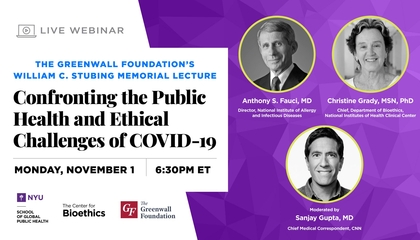The COVID-19 pandemic has changed how we conduct daily life, and integrated public health into nearly every aspect of it. In healthcare spaces, officials who typically address only their peers or a small number of followers have had to pivot to provide lifesaving information to a global audience.
Two such public communicators who were prominent experts during the pandemic are Dr. Anthony Fauci, director of the National Institute of Allergy and Infectious Diseases, and Dr. Christine Grady, head of the Department of Bioethics at the National Institutes of Health Clinical Center. In a compelling discussion moderated by CNN chief medical correspondent Dr. Sanjay Gupta, this year’s Stubing Memorial Lecture focused on the ethical challenges that arose during the Covid pandemic.
“We've got to be clear that public health emergencies, in terms of helping all of us, sometimes require a little bit of burden on the part of the individual,” said Dr. Grady.
The pandemic continues to test the boundaries of what people are willing to do to keep their communities safe. A flood of disinformation on social media can quickly contribute to lives being lost, as a result of people following opinions rather than facts. And distrust of medical professionals by a wide swath of the public has led to new questions about how to ethically communicate while constantly adjusting to new data.
Dr. Fauci said the most useful advice he received from Dr. Grady was to keep in mind how the public would respond, in addition to relying on his professional training.
“I think the experts have to use data to inform policy, but they also have to be aware of the needs and concerns of the public, and try to somehow bring those into the equation when they're making policy,” said Dr. Fauci.
Dr. Gupta took questions from the audience about vaccine mandates and the future of the pandemic. For Dr. Fauci, the ideal scenario is the continued decline of COVID-19 in the U.S., to fewer than 10,000 cases a day. Asked about the future of a career in healthcare and bioethics, both Dr. Fauci and Dr. Grady ended on an optimistic note.
They agreed that despite the difficulties of their jobs, they would not want to work in any other field. “I'm sure there's gratification and important contributions in many different professions, but don't be dissuaded by some of the difficulties we’ve been talking about tonight, because the positive aspects overwhelmingly outweigh any negative aspects,” said Dr. Fauci.
“I would do it for nothing,” he continued. “If you gave me enough just to eat and sleep I would do it, and I mean that very sincerely. It's that meaningful.”
